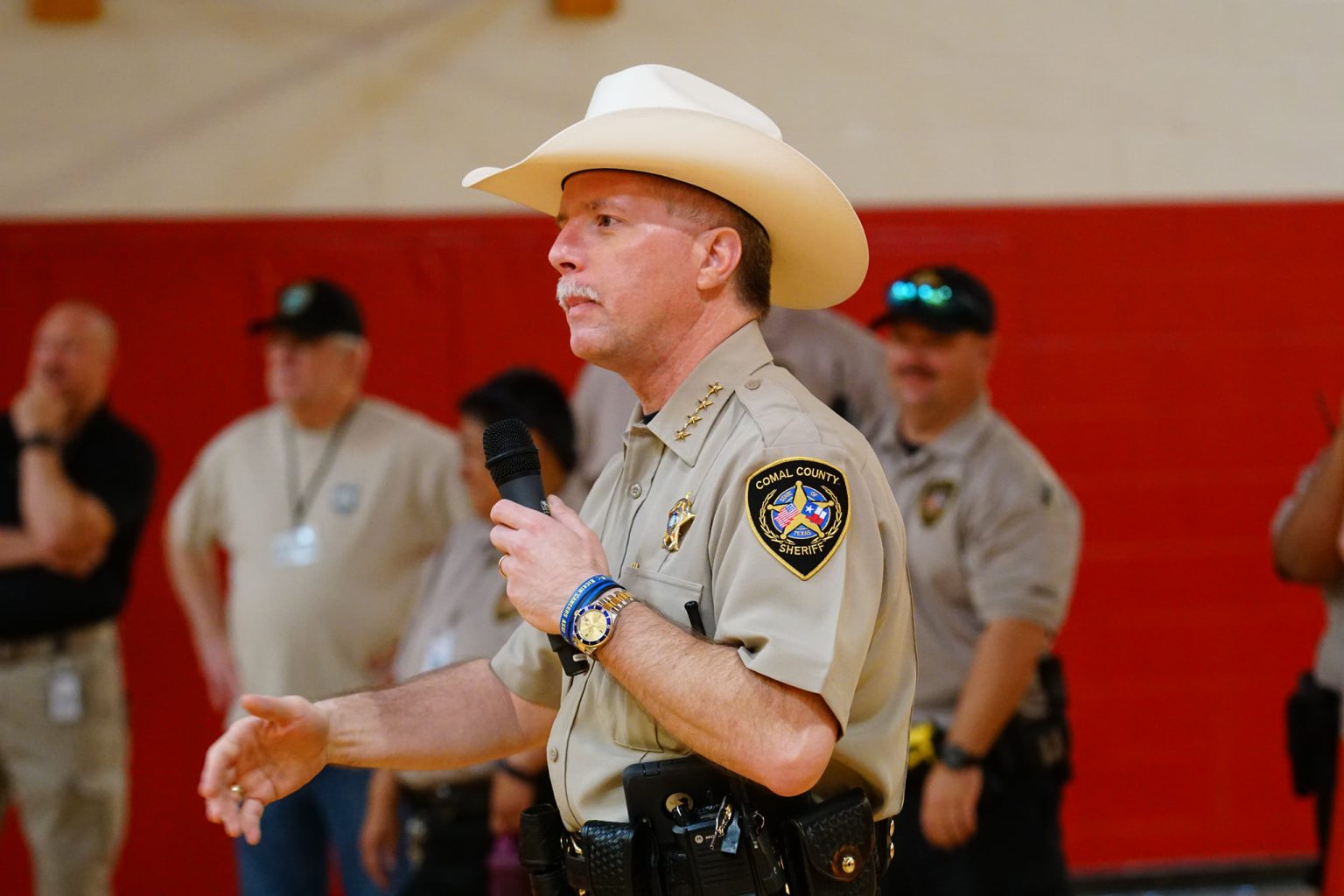Comal County Sheriff Mark Reynolds looks in the mirror every morning before he goes to work and repeats his oath of office aloud.
Upholding Texas law and the U.S. Constitution in one of the 10 fastest-growing counties in the United States isn’t easy, he said.
Texas’s border policies are reshaping the way law enforcement in Comal County and around the state do business, making it even harder to deal with issues like drugs, sex trafficking, policy differences with other law-enforcement (LEO) agencies, and Animal Control.
Loose dogs are one of the hottest topics on social media.
The Sheriff’s Office also is responsible for courthouse security, managing the county jail and enforcing court orders in civil and criminal cases.
Which is why Reynolds, who oversees CCSO’s $51.5 million annual budget and has worked in law enforcement in Comal County for 34 years, hopes voters will return him to office for a third term on Tuesday, Nov. 5.
His opponent, David Williams, a former Bexar County sheriff’s deputy and CCSO deputy who now works as New Braunfels police officer, simply doesn’t have the experience, he says.
Reynolds said he has nothing personal against Williams but doesn’t want accusations that keep popping up on Williams’ Facebook page to go unanswered, starting with the way staffing shortages are affecting his office.
As part of Operation Lone Star, Reynolds said in 2021 Texas Gov. Greg Abbott decided to start redeploying state troopers who work for the Department of Public Safety to the border, forcing Sheriff’s Office deputies to CCSO to patrol roadways in their absence.
As a result, many sheriff’s offices and police departments are short-staffed, and CCSO has worked hard and tried to think outside the box to make up the difference.
To allow CCSO to be more competitive, Commissioners Court authorized the Sheriff’s Office to increase salaries to $67,000 starting in January 2025.
In his 2025 budget, which was approved by Commissioners Court, Reynolds asked for 18 new deputies, two new detectives, six new communications and dispatch officers and four corrections officers.
Part of the funding for this staff will be financed by the county’s fund balance and the recouping of tax dollars coming from other counties that need jail beds for their inmates. CCSO has contracts for $108 per prisoner per night.
“Deputy sheriffs are very expensive,” Reynolds said.
In addition to paying each deputy a salary of around $67,000, CCSO also pays for fringe benefits like insurance, which adds another $40,000 in expenses per deputy. New hires need a $100,000 car, uniforms, pistols and rifles.
The estimated cost per deputy is around $250,000.
Reynolds also said that Williams’ statement that CCSO detectives only work during business hours is untrue. His staff works staggered hours and also enjoys flexibility about work scheduling.
“We know that a lot of people who may report a burglary may work during the day and are hard to reach,” he said.
Statements about CCSO being unwilling to respond to or investigate reports of child sexual assault on Comal ISD campuses also are completely unfounded, Reynolds said.
“We would throw every resource we had” into every incident reported, he said.
CCSO staff meet or exceed all training requirements set by the Texas Commission on Law Enforcement.
“Williams likes to go to class a lot,” Reynolds said. “Like, because it gets you out of patrol work? At some point, we have to apply the knowledge and skills learned in the classroom to what we do on the road.”
CCSO deputies, corrections officers and telecommunications staff all are licensed. CCSO also sends staff to other schools specializing in criminal investigations, SWAT teams, and a variety of other specialized topics.
Reynolds is best known in Canyon Lake for being part of a 2017 multi-jurisdictional task force called Operation Crystal Lake that resulted in the arrest of 38 major meth dealers.
Law-enforcement officers with the U.S. Drug Enforcement Agency and the U.S. Marshalls also participated, along with U.S. Army Corps of Engineers.
While it’s true CCSO does not collaborate with federal agencies as much as it used to, Reynolds said there are good reasons for that.
Serving warrants on high-risk individuals is dangerous. and he wanted his officers wearing cameras in case someone started shooting and fingers started pointing.
“When Williams says the only the people we participate with is DPS this is untrue,” Reynolds said. “We have agreements with surrounding sheriffs’ offices and a multitude of agencies. Our chief deputy is a retired Texas ranger…DPS has long arms and vast resources. If we need a helicopter we can have on in the county in 10 minutes.”
Reynolds won’t allow the federal government to supersede Texas law or the U.S. Constitution.
“I told people if you don’t want federal agents at your residence without a warrant, you can ask them to leave,” he said. “If they refuse to leave, we will take appropriate action.”
Reynolds said he also refuses to cut services to residents due to staff shortages.
CCSO allows people to submit reports online as a convenience. This helps small businesses to document, say $5 thefts at the gasoline pump, or people who prefer the convenience of not waiting around for a deputy to show up.
But a deputy will arrive to take statements anytime a citizen requests one.
Reynolds said he is a Rotarian, serves on the Wurstfest organization, is a member of the Comal County Fair Association and serves on the board of the Texas Association of Counties Risk Management Pool, and is a member of the Sheriff’s Association of Texas, serving on their legislative committee and the Texas Commission on Law Enforcement committee.
He’s also a member of three Texas chamber of Commercs and many other organizations.
“It’s all about service and giving back to the community.”




